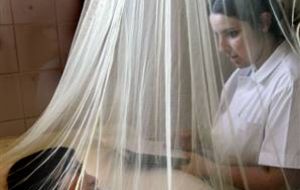MercoPress. South Atlantic News Agency
Dengue confirmed in five countries and in Brazil’s posh seaside resort

The mosquito transmitted dengue disease which has caused havoc in the heartland of South America and at least five countries, has now been reported in the northeast of Brazil where authorities confirmed Monday the spread of the disease with a death toll of 25 people since the beginning of the year and 4.751 new cases reported in the last week.
The Health Secretariat of the State of Bahia also revealed that another 26 deaths, with dengue symptoms are under investigation at the coroner’s lab.
So far this year, 21.407 cases have been reported in Bahía almost three times the number of last year and most of them are concentrated in seven municipalities. One of the towns is Porto Seguro a first line international seaside resort with three dengue deaths confirmed.
Bahia Health minister Jose Gomes Temporao who participated in a dengue prevention seminar in Salvador said that one of the causes of the outbreak, spread and deaths can be tracked to recent elections last October when municipal authorities changed in many counties.
“We warned the mayors of the importance of fighting the disease during the transition period, but this did not happen in many cases. There was a discontinuity in prevention tasks and over 40% of health related elected officials were replaced”, said Minister Gomes Temporal.
Meanwhile Paraguay reported that the number of confirmed cases has climbed to 450, which are 51 more than last week with the disease spreading evenly in urban areas.
In neighbouring northern Argentina, in the province of Salta which recently suffered devastating mudslides the number of confirmed cases reached 117, another 600 have been described as suspicious and two deaths, following blood tests in Buenos Aires, have been confirmed as dengue.
Moreover six of the confirmed cases are of the more virulent variant, haemorrhagic dengue which can cause death.
To the north of Salta, in Bolivia which this tropical season has been the country most punished by the Aedes Aegyptus mosquito, with at least 27 deaths confirmed and 60.000 cases reported has been receiving from overseas donations of fumigation equipment and chemicals to help combat the mosquito larvae which breed and proliferate in stagnant waters, following the intense summer rains.
And towards the Pacific, Peru launched last week a national prevention campaign to fight the mosquito after having admitted at least 5.000 confirmed cases of dengue.
Suspicious cases are usually two to three times the confirmed.
Dengue causes head aches, abdominal pains, fatigue, diarrhoea, vomiting, loss of appetite and spirit and acute dehydration. The haemorrhagic variant, the double bite of the mosquito, leads to internal bleeding and has a very high death rate.




Top Comments
Disclaimer & comment rulesCommenting for this story is now closed.
If you have a Facebook account, become a fan and comment on our Facebook Page!